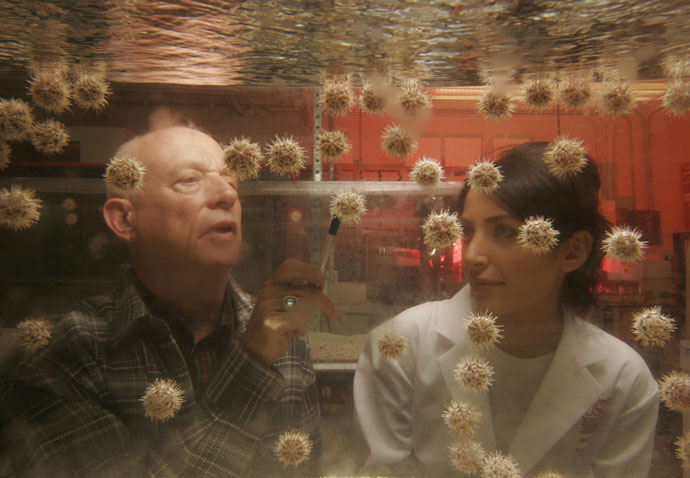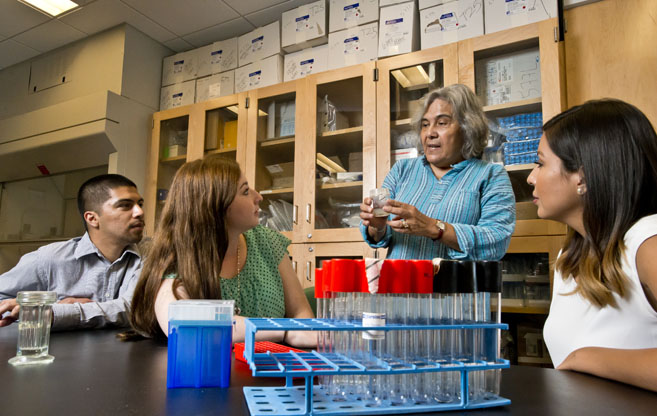Celebrating National Mentoring Month: How Two CSUN Faculty Have Changed Students’ Lives
California State University, Northridge biology professors MariaElena Zavala and Steve Oppenheimer are well known in their department and on campus, and have been recognized by the White House for being mentors and role models for students.
Zavala, who has been teaching at CSUN since 1988, and Oppenheimer, who has been teaching here since 1971, have both been awarded the Presidential Award for Excellence in Science, Mathematics & Engineering Mentoring. Together, they have mentored hundreds of undergraduate and graduate students, many of whom have gone on to become successful researchers, teachers, professors and medical doctors.
So what does being a mentor mean, and what unique things do these professors do to help students become so successful?
Oppenheimer, who received the award from President Barack Obama in 2010, said being a great mentor means being a great professor and inspiring students to develop a passion for science. He said his own professors and mentors opened the doors of science for him and showed him how to do science right.
“In many cases, the person who takes more interest in a student, actually turns the student on to science,” Oppenheimer said. “Part of loving science is loving the teachers who presented the science. You want students to love their professors because it helps the student in their own careers, in their own striving for success. In my case, they say they love my jokes. I’ve been telling the same jokes for 45 years, but students have come back to me 20 to 30 years later and they remember. It brings a warmth to [learning].”
Greg Zem, who earned a bachelor’s degree in biology from CSUN in 1985, is one of Oppenheimer’s former students. He currently teaches eighth-grade science at Ernest Lawrence Middle School, a highly gifted magnet school in the San Fernando Valley. Zem still works with Oppenheimer on research publications, and said the professor continues to mentor and teach him.
“Dr. Oppenheimer is probably the most influential person ever, as far as my career goes,” Zem said. “You want him to teach you science — it’s crystal clear when he explains it. A teacher like him comes along rarely. I had an initial love for science and he expanded it exponentially.”
Zem said Oppenheimer also influences the lives of his own students. He brings about 80 of his students to CSUN every year to present in a K-12 science symposium coordinated by Oppenheimer. Zem’s students also publish their work in CSUN’s New Journal of Student Research Abstracts, which Oppenheimer helped to create more than 20 years ago and still manages as editor-in-chief.
“[Oppenheimer] helps my students’ academic careers,” Zem said. “[At the symposium], he gives them a great speech and they’re so inspired after that. They just float out of that symposium.”
Zavala, who received her mentoring honor in 2000 from President Bill Clinton, said mentoring can be done in the short term or long term, and on professional or personal levels. It involves building trust with students, having cultural competency and providing opportunities for networking. Her ultimate aim as a mentor is to foster her students’ independence and support their vision for success.
“The idea is to try to help people and share knowledge, to help them achieve their goals,” Zavala said. “It’s not my job to make decisions for the students — it’s to help them think through what their choices are, to help come up with approaches that might help them achieve their goals.”
Zavala, who was the first Mexican-American woman in the country to earn a Ph.D. in botany, also has served as the director of CSUN’s Minority Access to Research Careers Undergrad Science Training and Academic Research (MARC U-STAR) program for more than 25 years. She said developing good mentoring relationships in scientific fields is important because those fields lack first-generation, minority and women scientists.
“[Mentoring] is so important for people whose families don’t include a lot of professionals,” Zavala said. “Being a professional involves more than knowledge of and passion for your profession; you have to be given opportunities to talk about your science. The mentor can provide an entree into the profession, where students get to meet the ‘boss’ ’ friends and develop a network of scientists. You need to gain cultural capital.”
Zavala’s former MARC program student, E. Lisako Jones-McKyer, who graduated with a bachelor’s degree in psychology from CSUN in 1995, is now a tenured associate professor of health promotion and community health sciences at Texas A&M University. She said Zavala helped prepare her for her doctoral program and future career.
“She prepped us for the kind of challenges we would face in grad school in a research career,” Jones-McKyer said. “At CSUN, there is a significant number of first-generation students. A lot of us have impostor syndrome — a feeling that you didn’t achieve things because you are good, but for other reasons, as if you don’t belong. She knew we would face discrimination and gave us the confidence we needed.”
Jones-McKyer said Zavala has positively influenced her and she still looks up to Zavala for advice and mentorship.
“She changes people’s lives — it’s one thing to teach someone, but it’s another thing to change the entire trajectory of someone’s life,” Jones-McKyer said. “I would not be here today if not for her. Through my graduate career, to this day, she hasn’t stopped mentoring me.”



 experience
experience